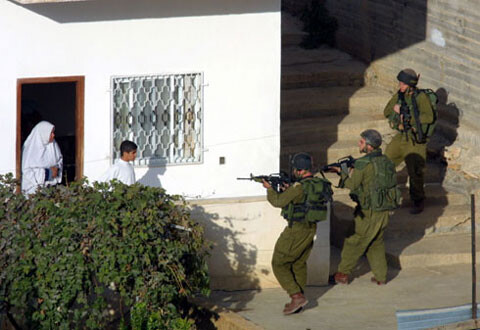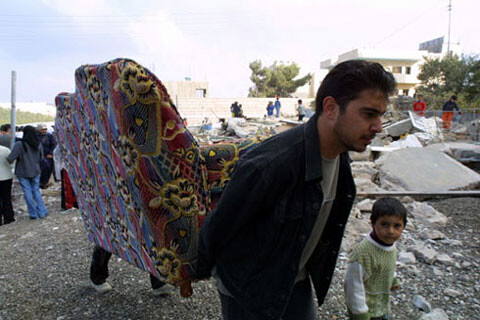
Israeli occupation soldiers conduct house to house searches in the Bethlehem area, November 2002. Photo by Musa Al-Shaer.
12 February 2003 - Israeli government talks about “the solution.”
Kids are gathered round a burned-out car in Bethlehem’s Manger Square. There is no school today, their town is under curfew. A Palestinian ambulance is stopped and searched in the rain. It’s another day under Israeli military occupation.
For weeks Israeli soldiers have been invading and reinvading the Bethlehem area, holding the residents captive in their homes. In the past two nights Israeli soldiers abucted 20 Palestinians from the Bethlehem area, adding them to the approximatly 9,000 Palestinian political prisoners being held, largely without charge, in Israeli jails.
A man who lives in a refugee camp called a United Nations Relief and Works Agency (UNRWA) ambulance for his sick child last night. UNRWA informed him, “We are under orders to not move.” This is the United Nations, too afraid of the Israeli military to use its own ambulance service. UNRWA is also talking about the one million Palestinians who could starve to death in the West Bank when the US officially declares war on Iraq — and an expected punishing curfew is implemented.
Last night in Bethlehem’s Manger Square, Israeli soldiers blew up a Palestinian car. An Israeli soldier stood watching, gun at the ready. Another car, with two Palestinians inside, drove by and shot the invading soldier.
One young man was trying to take a walk, “Just one day I want to be normal,” he said, “to relax.” Israeli soldiers sped through the streets yelling, “You are under curfew. Go inside your houses. All the people of Bethlehem: do not leave your houses.” And after, the Israeli soldiers shrieked, “allahu akbar.” The young man who wanted just to take a walk and sit in a cafe had to race home. No chance for a life.
Palestinian journalists called me last night, asking if we could all go together to get the story of the 50 jeeps and dozens of tanks. Their press credentials and bullet proof vests don’t protect them from invading Israeli soldiers the way a foreign passport typically does. In the end, no one went out. Journalists could not do their jobs. When light came and some of us were able to go out we were stopped by Israelis, told to turn our cameras off, told that this, the home of Palestians, is a closed military zone.
The United Nations Development Program (UNDP) is staking an area in Jordan called the Al Azraq desert, planning to build 60,000 small buildings. A friend, already a refugee, is telling the story. “They say these are for the Palestinians. There are Palestinians in Jordan, Lebanon, Palestine. I think when this war starts they’re going to transfer a lot from here.”
He’s sitting in the home he built in the camp, his eyes are teary, at once defiant and defeated. He goes on, “What can we do if they start loading families into buses? We can’t stop them. The Israeli government recently said that in 2025 there will be more Palestinians in Palestine than Israelis. They say the solution is to transfer one million Palestinians out of Palestine. I think this is the most dangerous news.”
Families who were given “permission” by the Israeli military to visit family members for Eid, those who the Israeli government exiled from the West Bank to Gaza were stopped by Israeli soldiers along the way, new clothes and haircuts for nothing.
While the Israeli government is talking about “the solution,” reporters are calling, asking about the so-called peace negotiations being held inside ‘48. These are meetings that Sharon has denied permission to Palestinian President Arafat to attend.
13 February, 2003 - Thousands of Palestinians Regularly Rendered Homeless
Last night 30 invading Israeli soliders tore through a house on the edge of a Bethlehem refugee camp. Arriving in 12 heavily armoured jeeps with blue lights flashing at midnight, they took measurements of the house, home to several units of the same extended family, and the house next door, signs that usually precede Israeli demolition of Palestinian homes.
That house is small, someones grandmother’s home. She is stiing in a chair in her leafy garden in front of the house. She is staring to the side, not speaking, not crying.
The larger house, which Israeli soldiers will blow up the grandmother’s house in order to get to, has a roof that many nights during curfew people meet on, making a barbeque in an old can. It is impossible to meet in cafes or restaurants, most are closed because of curfew and there isn’t much money to spend anyway.

Israeli occupation soldiers blow up a Palestinian home during a home demolition in the Bethlehem area, November 2002. Photo by Musa Al-Shaer.
In the night, after the Israeli soldiers left, people from the camp came out from their houses to help the families carry out their salvagable belongings. A replica of Al Aqsa mosque, a half smashed television, blankets, suitcases, a little girl comes out of the door with a backpack holding hands with a friend. She must find a new place to sleep, as must everyone.

Palestinians move furtniture in anticipation of a home demolition in the Bethlehem area, November 2002. Photo by Musa Al-Shaer.
Friends from around the camp were shaking hands, one walked up to me and shrugged. The one whose house it is said, “thank you,” and “if god wills it.” Today women are lined up in chairs across the narrow ally street from the house accepting hand shakes and kisses on the cheek from neighbors who come to offer condolences. They are all homeless now.
The Israeli soldiers said they would be back to blow up the houses. Maybe now, maybe later. No one knows anything concrete, as is normal in this campaign of psychological warfare that the Israeli military government is waging against the Palestinian people. They did the same thing in Deheisheh camp 4 months ago and the people are still waiting, outside of their house, because at any moment Israeli soldiers might arrive to destroy it.
Israeli soldiers dug up the main road out of Beit Sahour, creating a roadblock higher than two cars atop one another. An old woman there tells me that her flower garden used to be so beautiful, that the stone fence in front of the road was so beautiful. There are tanks in the hill behind and jeeps driving past a road now gone to mud. Meanwhile, my friends here keep telling me that tomorrow is Valentine’s Day.
Kristen Ess is a political activist and freelance journalist from New York City, who has lived in the West Bank and Gaza since March 2002, where she does solidarity work and reports for Free Speech Radio news and Left Turn magazine.
